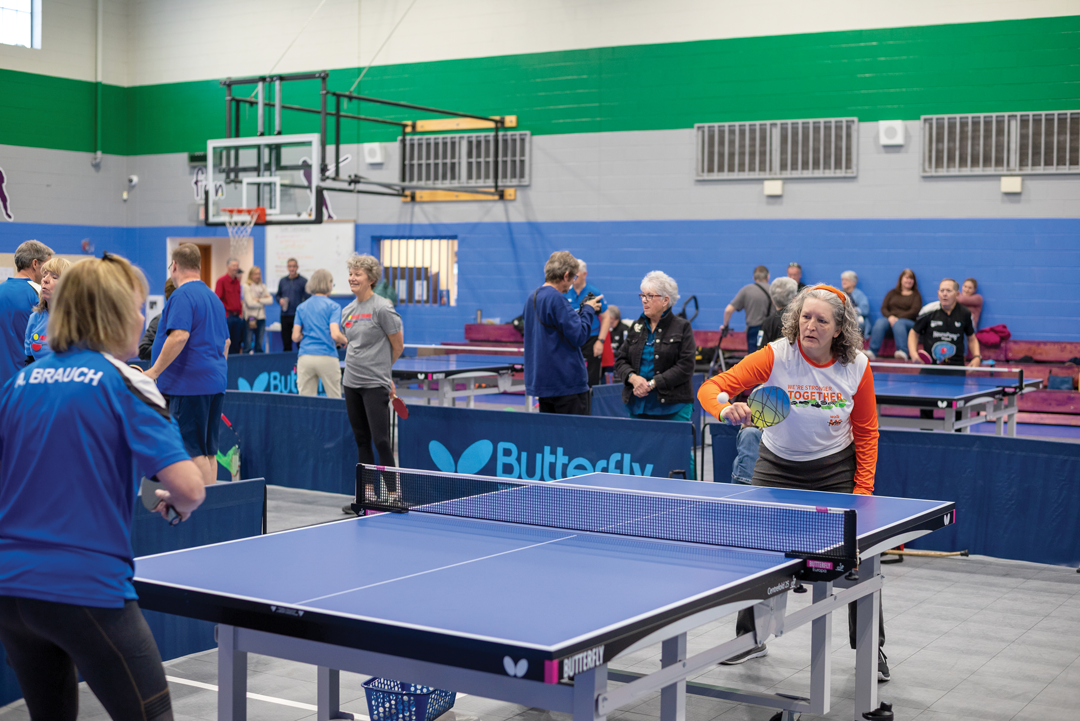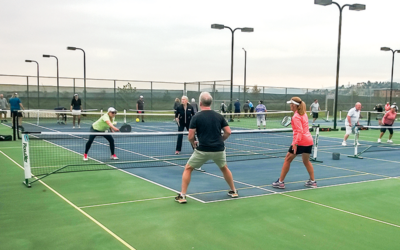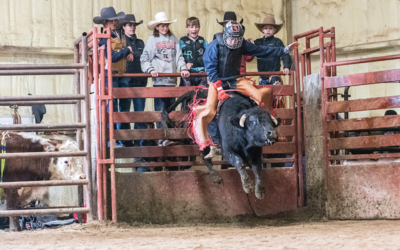Antonio Barbera was diagnosed with multiple sclerosis (MS) in 2016. A year later, he would discover what makes it so devastating: The disease can change the lives of those it affects without warning.
He was a gynecologist for 31 years. After delivering a set of twins in early 2017, he decided to play a game of ping-pong in his garage as a way to unwind. He couldn’t grip the ball.
His arm became paralyzed that same day, and soon after, he realized, at age 55, he would have to retire.
Barbera regained the use of his arm over the next few months, but MS wasn’t done with him. That same year, it started to feel like an elephant was sitting on his chest at all hours, one of the many strange symptoms that come with the condition. He kept playing ping-pong because he loved the game and couldn’t think of anything else to do. Rather than reminding him of his new limitations, it changed his life.
After playing for a few days, Barbera noticed something: The elephant had left the room. Intrigued, he began learning as much as he could about the brain and neurodegenerative conditions such as MS that affect it.
Six years later, on a Saturday morning last December, Barbera gathered more than 50 players with neurodegenerative conditions and their loved ones and caretakers for the first NeuroPong tournament. The event took place in a gymnasium at the Boys and Girls Club in Fort Collins and was a celebration of Table Tennis Connections, the nonprofit Barbera founded in 2021 that has since become his full-time job. Barbera helps others with MS, as well as those suffering from Alzheimer’s, Parkinson’s, attention deficit disorder and similar conditions to embrace ping-pong as a form of mental and physical therapy.
Before the matches started, Barbera strolled around with an umbrella, and guests wondered if it had to do with his MS. After all, the disease causes all sorts of symptoms. Some have obscured vision or trouble walking or talking, and others have sensitivities to bright light, noise or smells. Doctors still don’t fully understand it.
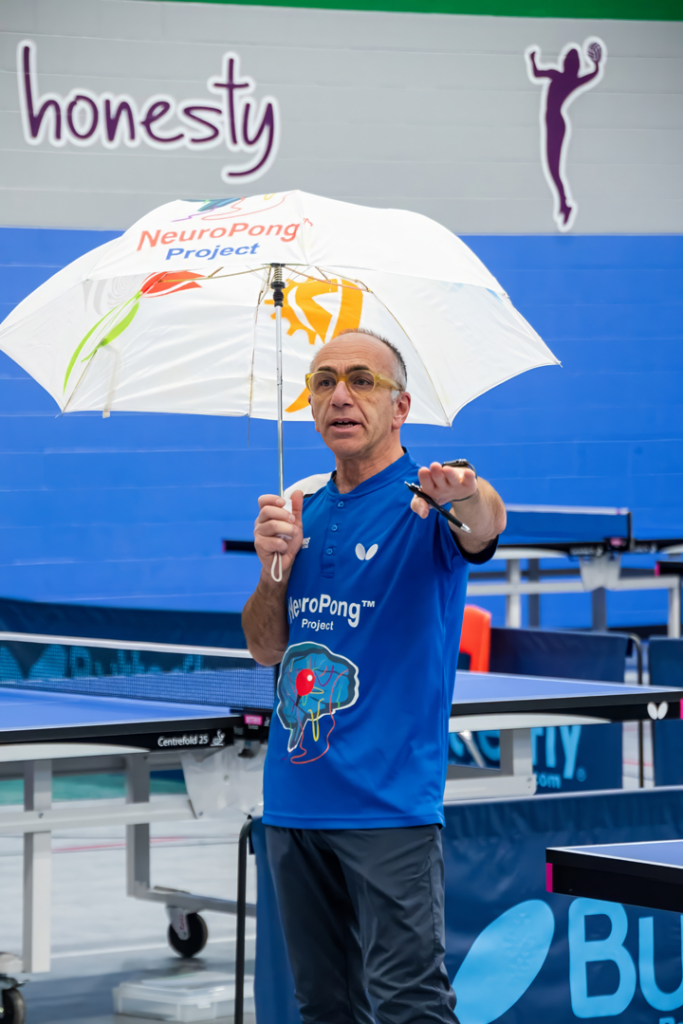
Antonio Barbera. Photo by Jordan Secher.
In reality, the umbrella represented who was waiting to play that day: There were people with all kinds of neurological conditions under one, er, umbrella. This was important, he told the crowd, even if the way he demonstrated it was admittedly silly. He hoped they would remember it as they played against one another. That day was not about medals or trophies or even a ribbon. It was about unity.
“You guys already won a championship,” Barbera said to the players. “You are here today.”
As he scurried from table to table to help players and direct volunteers to scoop up the dozens of ping pong balls that fell to the floor, he saw Dee Sullivan, of Loveland, moving side to side without her cane. He saw Jan Folsom, of Boulder, smiling as she landed sweet shots onto the corners of the table, even as Barbera had to help her keep score. He watched Bill Peck, 79, of Broomfield, who spent his life playing sports, even adult softball until he was nearly 60, get to be an athlete again.
Sure, Barbera still has trouble with the elephant, not to mention a leg that feels as though it’s on fire at least once a day, and he doesn’t see very well. But he immediately brushed aside his own problems and raced over to help an elderly woman who had fallen while playing. When he asked if she was OK, she burst out in laughter because she tended to fall all the time and was used to it.
“Really,” he said, watching Sullivan try three times to hold a ball so she could serve, “who am I to complain?”
A life-changing condition
Sullivan was 31 when she woke up one day in 1995 and couldn’t move or talk. She was hospitalized. She ate through a feeding tube. Nurses yelled at her to stop misbehaving when she angrily pointed at a glass to ask for a drink of water.
It’s now difficult for her to walk, even with her cane. She has a hard time with her speech, and gripping anything is a chore. But these are hard-fought victories achieved through 20 years of physical therapy, not things to be sad about. She now has a service dog, a loving husband and a new purpose advocating for other MS patients.
She also has table tennis, a sport she discovered through Barbera’s organization a couple years ago. Now she can play without a cane, grip a ball and even hit some tricky shots. These are all things she couldn’t do before. She’s not sure why she can do them now.
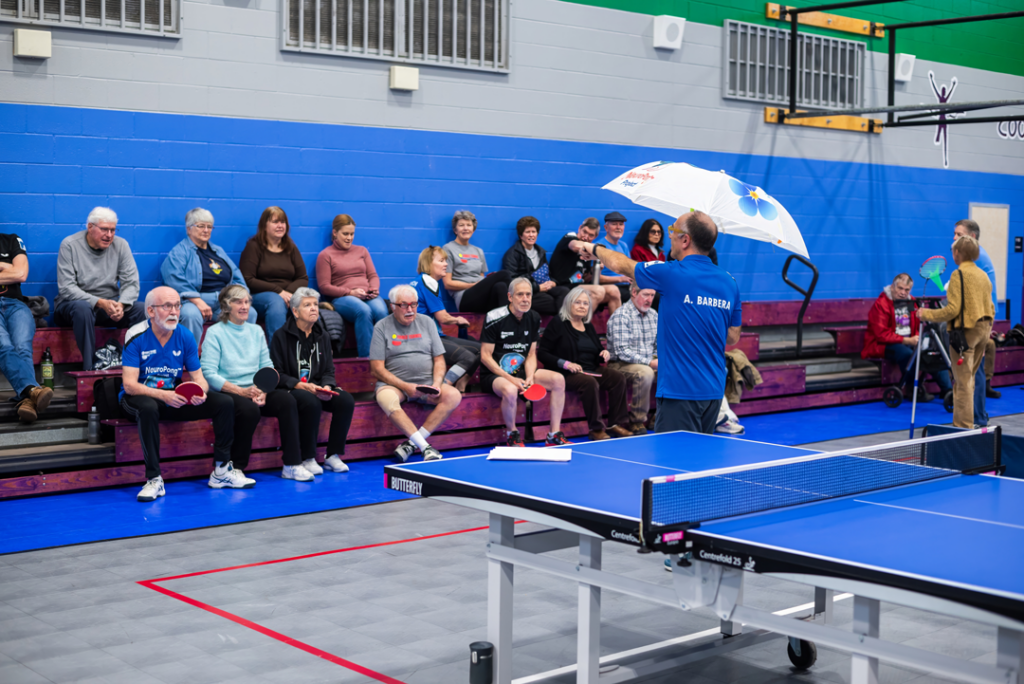
Photo by Jordan Secher.
“I don’t analyze it,” Sullivan says. “I just do it. I just want to be the best I can be.”
It’s probable that ping-pong is the reason, Barbera says, and he’s not saying that for selfish reasons. Table tennis requires the body and brain to follow a fast game and react quickly enough to put up a fight. It forces participants to work on their balance, hand-eye coordination and fitness, and it does all that without being as demanding or taxing as most other sports, Barbera says.
Several studies back up his observations, stating that those with a neurological condition such as MS or dementia who played table tennis showed improvement in motor skills and cognition.
Barbera loves the joy of the game, but he doesn’t coddle his players. They play twice a week for two hours at a time without any help. He pushes them because it works, he says, and others agree.
“It’s the best physical therapy I’ve ever had,” says Joseph Flanigan, 74, of Loveland, a longtime MS advocate who’s had the condition for 34 years.
Peck had only been playing for a few months before he noticed a difference.
“I feel pretty sure it’s helping a great deal,” Peck says. “I feel more balanced and more comfortable. Now I can play fairly well. And not only that, it’s a lot of fun.”
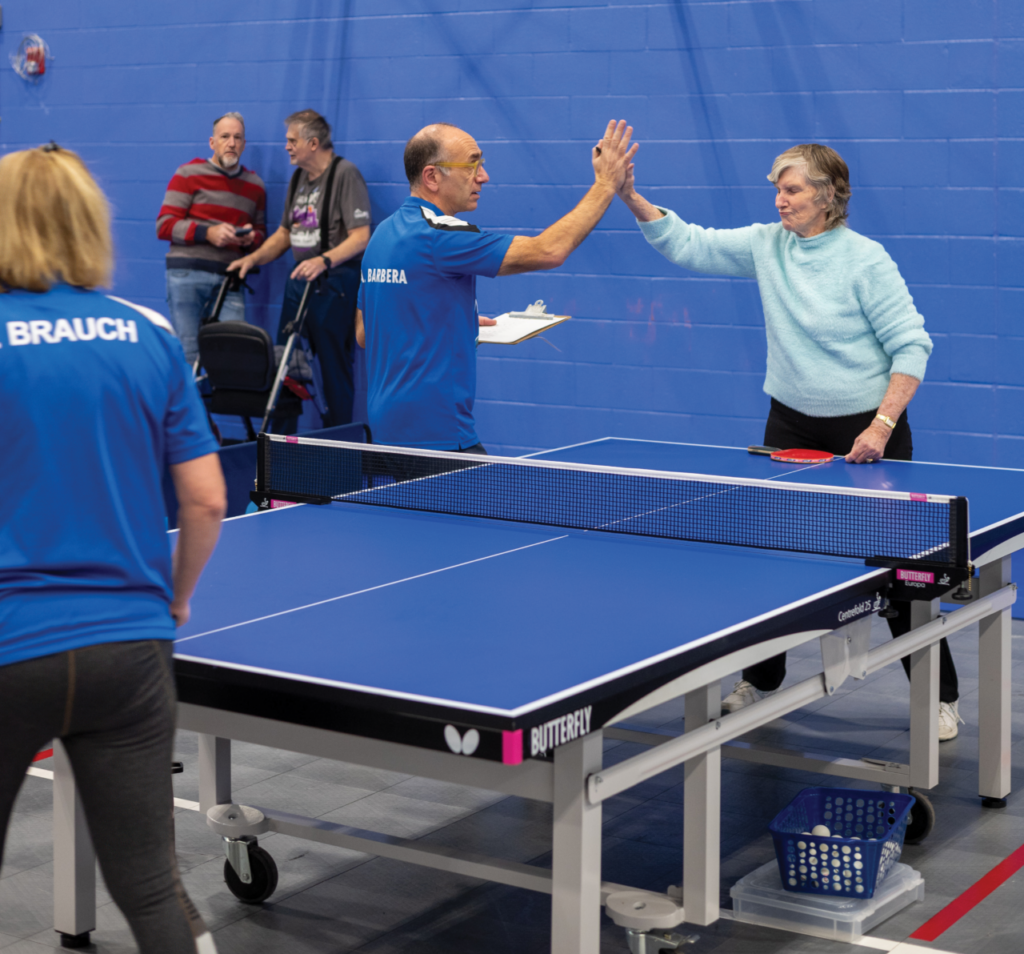
Antonio Barbera high-fives Jan Folsom. Photo by Jordan Secher.
Building community through ping-pong
The ability to enjoy the game with others is another reason people love Table Tennis Connections.
Those with neurodegenerative conditions tend to be isolated, either by choice due to a lack of activities they feel comfortable participating in or because they don’t have the support they need to get out, Flanigan says. This is why he thinks the ping-pong games are something special.
“This is not a support group,” Flanigan says. “People don’t come here and whine about their disease. They engage it. That’s a big difference.”
Mindy Conradi recalled the struggles she and her siblings faced while visiting their mother, Folsom (she’s a distant relative of the Folsom family the University of Colorado’s football field is named after). Folsom has moderate dementia.
“It’s hard to know what to do with her,” Conradi says. “You can do puzzles or watch old movies.”
Ping-pong gives Folsom what she craves: The ability to be part of a community. The games are engaging, challenging and, most importantly, played with others who understand her condition.
“Just to be able to participate in a group is so huge, not just for her but for us,” Conradi says. “Caregiving is really hard.”
She remains impressed with her mother’s ability, and watching her play reminds her of all the times they played ping-pong as a family in the basement. Conradi chokes up when she talks about the impact Barbera has had on their lives.
“We were so amazed when we found this,” she says. “He’s an angel.”
Barbera brushes this off, though he does enjoy talking about how his organization has expanded into other Colorado cities and even internationally. More people are finding help through table tennis, he says. He feels better too. The elephant weighs less, but the laughter lingers.

